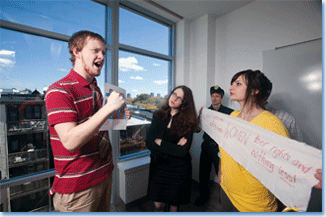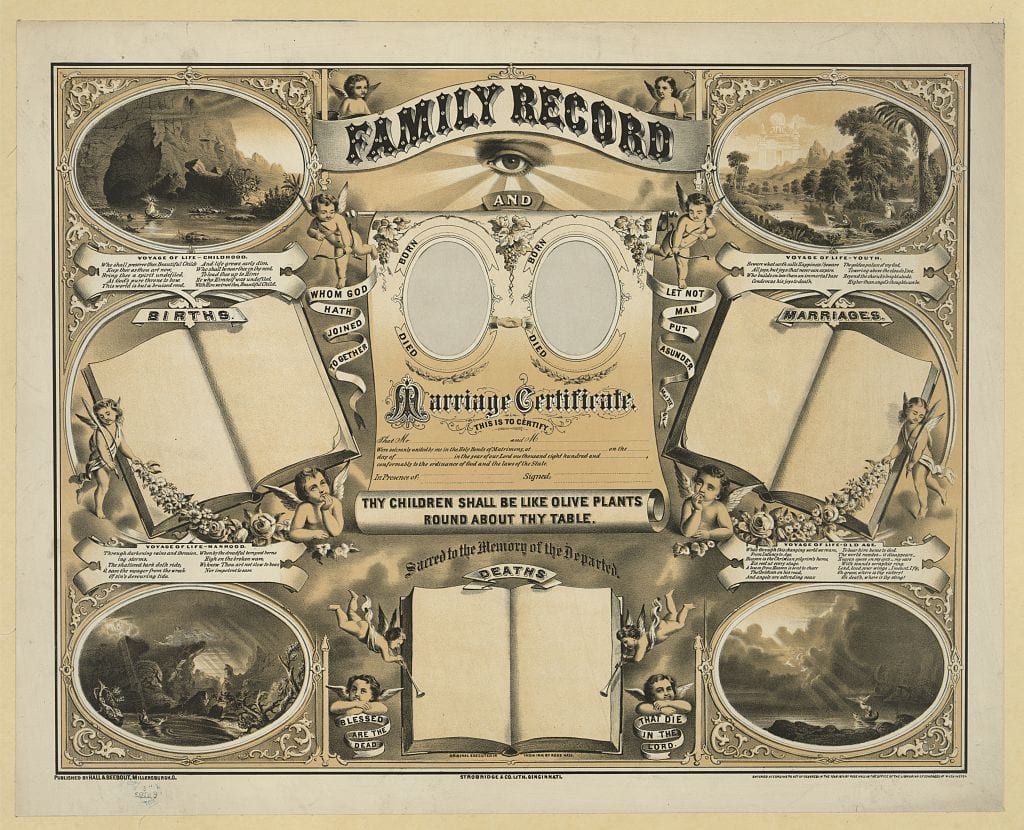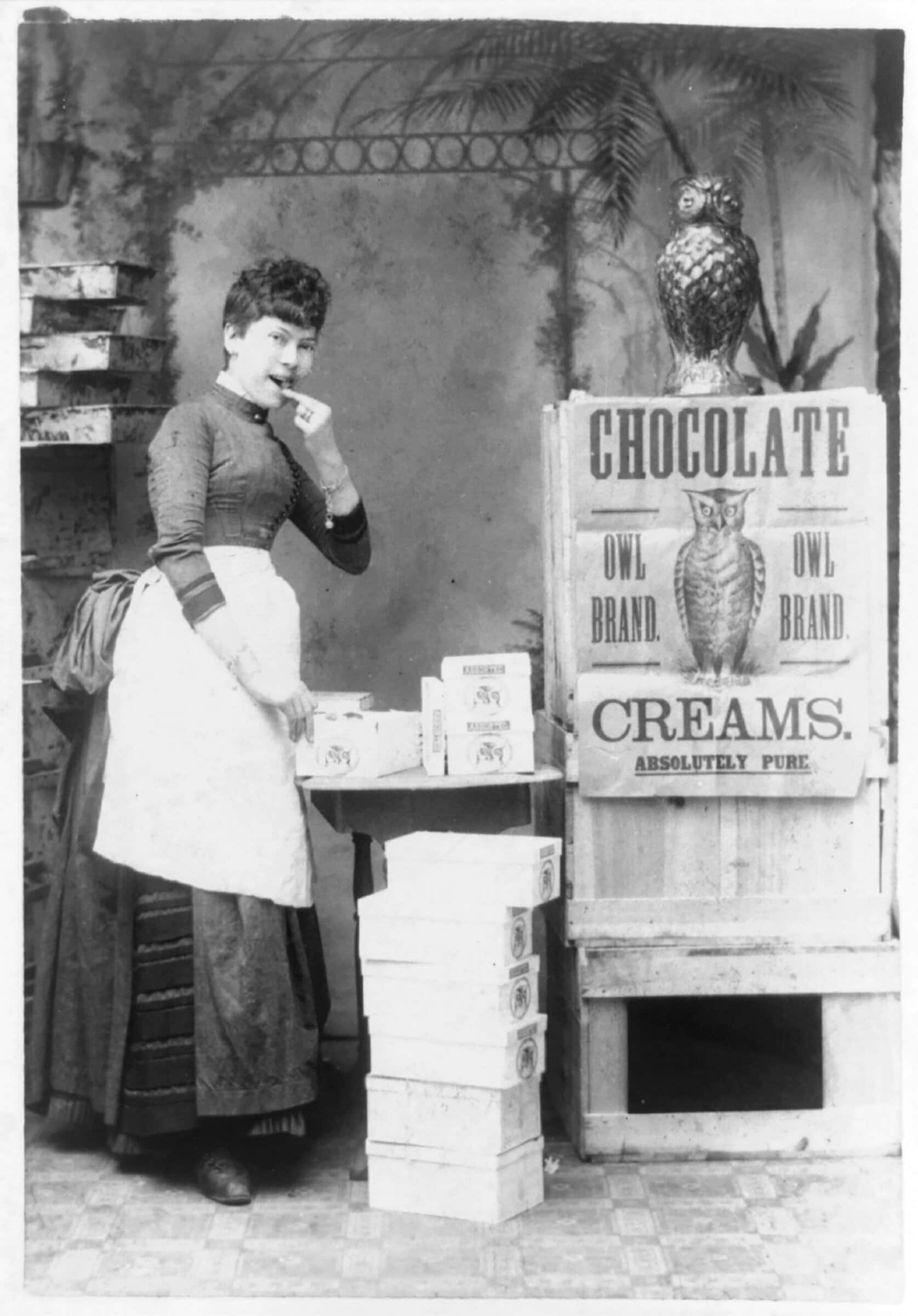The beak of his Mets hat, tilted upward, was twisted halfway around his head as he walked-no, loped-to the front of the room. “His name is Juan,” Barbara Waldinger whispered, sitting next to me in the back row of her classroom at Queens College in New York City. Her students were midway through The Trial of Anne Hutchinson, one of the nearly threedozen games in the Reacting to the Past series. Reacting to the Past is a pedagogical initiative, created by faculty and administrators, in which students play elaborate games set in the past and informed by classic texts.1 At present, faculty from over 300 colleges and universities teach with Reacting games.)) Juan had the role of John Winthrop, governor of the Massachusetts Bay Colony.
As Juan neared the blackboard, he stopped and pivoted. Now facing his peers, he moved closer, his yellow and grey Air Jordans nearly touching the shoes of those in the front row. He scanned the room and spoke with a slight accent.
Wasn’t easy getting here. Not for any of us. Remember the Arbela, out there in the ocean? I told you we’d have to stick together. It didn’t get any easier when we got here. Some got sick. Some died. . . . But we stuck together, right?
His splayed fingers reached toward one clump of students, as if to grab them. Then, releasing them with a twist of the wrist, he moved to the other side of the room and reached out to others.
But Anne, nunh-uh. She says we don’t have to stick together. Says that some of us are saved and some aren’t, and she knows who. All her friends-right over there-they’re saved. That’s what she says. What about the rest of us? No way, no how. Says we’re damned to hell.
“That’s wrong!” a student called out. Her accent was eastern European, probably Russian. “That’s ridiculous. You’re driving us apart! You won’t let the new immigrants into the church!” She gestured toward a group of students seated in the back row to my right.
Juan looked at her.
I’m not on trial here. Anne’s the troublemaker. She says our ministers don’t know what they’re talking about. How does she know? Seems that God talks to her. That’s what she says. Just her. He must whisper in her ear or something. You’d think He’d have better things to do. She says she’s a prophet. You know, like Moses? Next thing she’ll be walking in here with a big tablet.
The scattered chuckles throughout this monologue erupted into hoots. Juan smiled-the first acknowledgement that this was a performance-then he turned it off.

Students in Amy Tyson’s class at DePaul University debate woman suffrage and radical labor at the turn of the 20th century. Photo by Mark Zalewski
Well, that’s ok. Everybody can say what they want. But don’t you forget. We’re all in danger. Around every corner, every tree. You’re minding your business, right? Next thing you know you’ve got an arrow in your head. Look. We’re just trying to survive. Some want to help out. That’s good. That’s real good. Those who don’t, well, you just leave. And take Anne with you. Plenty of room out there in the woods.
Juan’s was a masterful performance, an ingenious fusion of hiphop swagger and orthodox Massachusetts Puritanism. To win the game, Juan had to win over the undecided-students who, though obliged to represent different Puritan sensibilities, were otherwise free to decide on the fate of Hutchinson. And Juan knew his audience. Queens College is the most diverse in the nation. Over two-thirds of its students are immigrants or the children of immigrants. Juan pleaded with them to band together in an alien environment.
Yet I grew increasingly uncomfortable with Juan’s riff. The more he translated New England Puritanism into an idiom that resonated with his classmates, the less he evoked the Puritan world as I knew it.
Had Juan brought history to life-or flat-out murdered it?
Some historians have charged Reacting to the Past with precisely this crime. They say that Reacting games encourage students to think that they can bring the past back to life. But they can’t. Critics maintain that deep role-laying constitutes an offense against the values of the historical profession.
“Juan Winthrop” could have served as Exhibit A in such an indictment.
But a case can be made for the defense. It was anticipated by R. G. Collingwood, a mid-20thcentury philosopher of history at Oxford who explored the distinction between the actual past and the historian’s renderings of it. Collingwood observed that if a historian were to claim, “I am Thomas Becket,” he would be speaking nonsense. But as far as we are concerned, Becket’s attributes are knowable through the words he left to posterity. Becket exists-the present tense is crucial-only when we bring his thoughts, as conveyed by his writings, into our minds. The historian, by studying Becket’s thoughts and rethinking them, acquires the subjective essence of Becket.
Some historians lampooned this thesis. In 1970, for example, David Hackett Fischer charged Collingwood with the fallacy of idealism. “To require a historian to rethink Brutus’s thought before he killed Caesar is to require him to become Brutus. And this he cannot do. . . . For Brutus did not merely think different things than Collingwood thought-he thought them differently.”2<
Fischer’s common sense reflected the positivist consensus of the historical profession-the conviction that more research and sophisticated analyses were bringing us ever closer to understanding the past. Collingwood’s roleplaying strategy substituted a specious and intuitive empathy for the hard work of historical research.
During the past quarter century, however, longstanding theoretical debates about the subjectivity of history have shifted fundamentally. A new genre of criticism focused on the mode in which historians advanced their theses. Hayden White, for example, showed how historians inevitably utilized narrative structures that resonated with the cultural expectations of their readers. Though clothed in the whitecoated garb of scientific empiricism, historians performed “an essentially poetic act,” utilizing tools of “emplotment” to shape their materials into tragic, comedic, ironic, or other literary tropes.3 Such arguments provided what many regarded as a fatal blow to historical positivism. By 1991 historian Lynn Hunt summarized the views of many when she declared that historians cannot stand on any “unproblematic ground of truth.” Their histories were always “a field of moral and political struggle in which we define ourselves in the present.” “History is ‘out there’ in some sense,” she added, “but its thereness is not fixable.”4
Thoughtful historians have experimented with narrative modes that reflect this new understanding, but the pedagogical implications of the theoretical work have been largely ignored. Some scholars, especially in literary theory, have advocated pedagogies of deconstruction, decentering, and interdisciplinarity. Textual sources must be subverted; students must be “disoriented” and “discomforted.”
But Stanley Fish has identified the chief problem with this pedagogical turn: “The proponents of radical pedagogy must negotiate an impasse produced by one of their own first principles, the unavailability of a perspective that is not culturally determined.”5How can professors, while professing, subvert their own authority?One answer is provided by deep role-playing games. The nearly 500 pages of roles, rules, and advisories in The Trial of Anne Hutchinson reflect designer Michael Winship’s theological interpretation of the dispute. But Juan, intent on winning the game, reshaped these materials to fit his alternative narrative of immigrant survival in a hostile world. Other students in the class simultaneously challenged Juan’s interpretation (“That’s ridiculous”). The experience of playing the game itself illustrated the elusive and contested character of the past.
Juan’s class did not provide a perfectly accurate representation of the past. Nor do our books and lectures. But while some historians artfully conceal ambiguities and complexities (lest readers and students get it all wrong), Reacting games are devoid of artifice. Everyone knew that the student in the Mets cap was not John Winthrop.
Juan’s class gained a deeper understanding of the contingency of history. Moreover, they learned that the past is never dead. It says something new to every generation.
Several years ago I received a postcard of the ruins of ancient Athens from Amanda Houle, a former student who was vacationing with her family in Greece. She had spent much of her first month at Barnard playing a Reacting game set in Athens in 403 BC, after the city had surrendered to Sparta. A few years later she had dragged her family to the ancient agora.
I searched until I found the small marble plaque marking the spot where Socrates is thought to have held discussions with his pupils. Staring at the worn stone, I found tears streaming down my face. When my mother pressed me for an explanation, all I could say was that, standing in the dust and ruins, some part of me was surprised not to find him there. In my mind, the agora exists as a bustling and exciting place where Socrates can still be heard in the early morning, speaking on matters of justice.6
Did Amanda know the man for whom she wept?
Perhaps not. But in her he lives.
Notes
- See www.barnard.edu/reacting. [↩]
- David Hackett Fischer, Historians’ Fallacies: Toward a Logic of Historical Thought (New York: Harper & Row, 1970), 196-97. [↩]
- Hayden White, Metahistory: The Historical Imagination of Nineteenth-Century Europe (Baltimore: Johns Hopkins Univ. Press, 1973), x. Emphasis in the original. [↩]
- Cited in Berkhofer, Beyond the Great Story: History as Text and Discourse (Cambridge: Harvard Univ. Press, 1995), 75. [↩]
- Stanley Fish, There’s No Such Thing as Free Speech (Oxford: Oxford Univ. Press, 1994), p. 237. [↩]
- Amanda Houle, “Reacting to Reacting,” Amanda Houle, “Reacting to Reacting,” Change: The Magazine of Higher Learning 38, no. 4 (July/August 2006): 52. 38, no. 4 (July/August 2006): 52. [↩]
Mark C. Carnes is a professor of history at Barnard College.
This work is licensed under a Creative Commons Attribution-NonCommercial-NoDerivatives 4.0 International License. Attribution must provide author name, article title, Perspectives on History, date of publication, and a link to this page. This license applies only to the article, not to text or images used here by permission.


